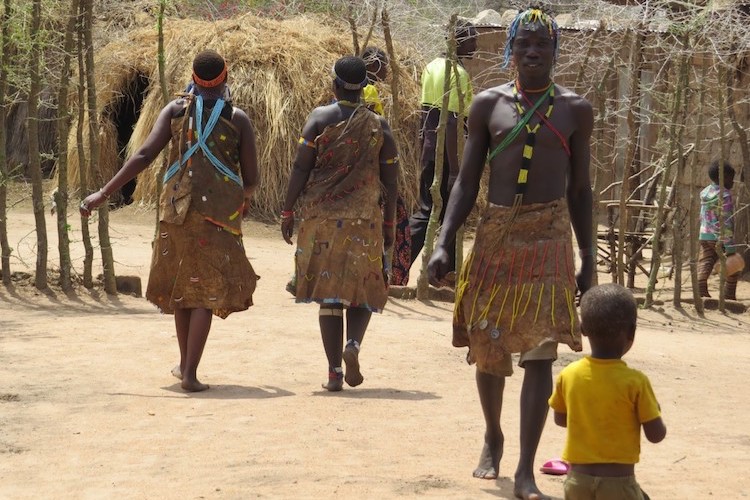
By Kizito Makoye
MANYARA, Tanzania (IDN) – At the heart of the Yaeda valley, which sprawls across a wide expanse of plains in Tanzania’s northern Manyara region, live the Hadzabe – a 40,000-year-old tribe who live in the bush. Their livelihoods still depend on hunting and gathering wild fruits, and for many years now, they have shown a great ability in surviving on a few dwindling resources.
Armed with vast knowledge of the country’s flora and fauna, coupled with their inseparable bond with nature, the Hadzabe have until recently lived in a perfect balance between man and the environment.
Today, this balance is increasingly being threatened by modernity and the worsening impacts of climate change, pushing the bush people to the edge of survival.
However, the Hadzabe are discovering new tactics to protect natural forests and cushion themselves from changing weather patterns, thanks a new initiative under the United Nations’ Reducing Emissions from Deforestation and Forest Degradation (REDD) project jointly implemented by the Hadzabe themselves and Carbon Tanzania, a company dedicated to producing carbon offsets through natural forest conservation.
While humans depend on earth for survival, plant life provides 80 percent of their diet, according to the United Nations. Moreover, the forests covering 30 percent of the earth’s surface, provides sanctuaries for many species, and important sources of clean air and water which are crucial for curbing climate change.
Nevertheless, persistent degradation is leading to the loss of approximately 13 million hectares of forests every year, leading to desertification which affect the livelihoods of indigenous communities.
The Sustainable Development Goals (SDGs) of the United Nations call for urgent action to reduce the loss of natural habitats and biodiversity which support global food and water security, climate change mitigation and adaptation, and peace and security.
As part of the international body’s recognition of their efforts to provide nature-based solutions to climate change and promote sustainable development, the Hadzabe community has won the 2019 Equator Prize for local, innovative, nature-based climate solutions.
The prize, worth 10,000 dollars, was recently presented to representatives of the Hadzabe community in New York in an event coinciding with the 74th session of the United Nations General Assembly.
The Equator Prize is one of the UN’s most prestigious awards for environmental protection and climate resilience. It is awarded after every two years to projects that show outstanding community efforts to reduce poverty through conservation and sustainable use of biodiversity.
Working jointly with Carbon Tanzania, the bush people have successfully developed a carbon-offset project that allowed them to restore 90 percent of their land that had been encroached on by livestock and farmers.
In a statement, Carbon Tanzania CEO Mark Baker noted that the Hadzabe had secured their land rights and obtained the Certificate of Customary Right of Occupancy (CCRO) in 2011, the first ever official document of this nature to be issued to an indigenous group in Tanzania.
While the Hadzabe are naturally conservationists, they had not previously fully embraced the concept of “owning” land in the modern sense, consequently they had little legal defence against encroachment by farmers or herders who trampled on the wildlife-rich woodland.
Now, said Baker, “the communities have in place governance structures, by-laws and land use plans to protect their habitat forest land in order to create carbon credits sold to companies and individuals to offset their carbon impacts.”
Under this initiative they have a legal tool to secure their community’s title to 57,000 acres of their territory and enter into commercial agreements to earn money from this land.
A total of 42 community members have benefited from the project, securing full-time employment after being trained on wildlife monitoring and forest protection.
According to Baker, each of the forest rangers earns 80,000 Tanzania shillings (36 dollars) a month and, since the project began selling carbon credits five years ago, the equivalent of over 300,000 dollars has been channelled to protection activities and spent on benefits for the people living in the project area.
The villagers spend monies generated from selling carbon credits to buy food as well as cater for their children’s school and health needs.
“We are very happy to receive this recognition which is a sign that our efforts to protect the environment are appreciated,” said Ezekiel Salimu, the village game scout in Yaeda.
Receiving the award, Ezekiel Phillipo, a representative of the Hadzabe community, expressed gratitude that they were able to earn a living through protecting the forests and wild animals.
“We always protect our environment because that is how we survive, so even if this carbon offset programme did not exist, we would still be doing that,” he said. [IDN-InDepthNews – 11 October 2019]
Photo: The Hadza people in Manyara. Credit. Edwin Mkendo.
IDN is flagship agency of the International Press Syndicate.
www.facebook.com/IDN.GoingDeeper – https://twitter.com/InDepthNews











